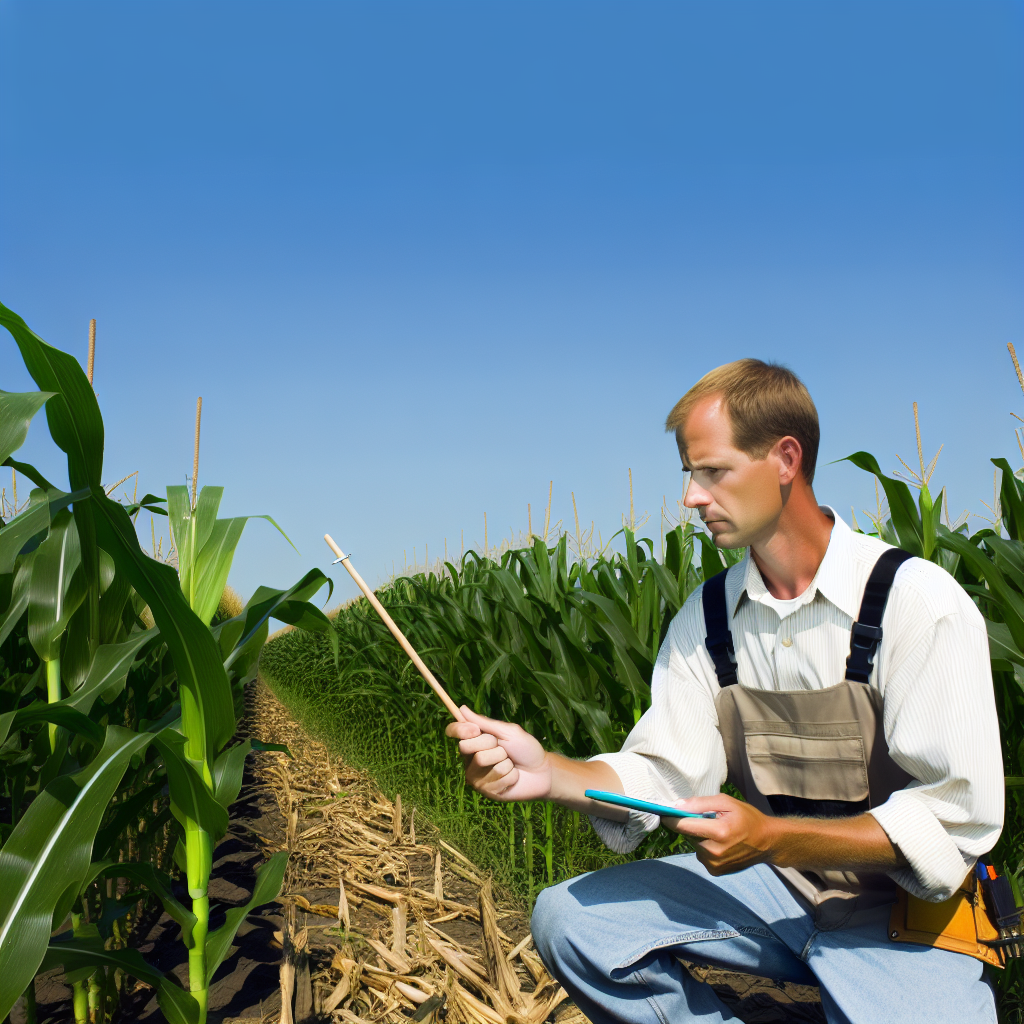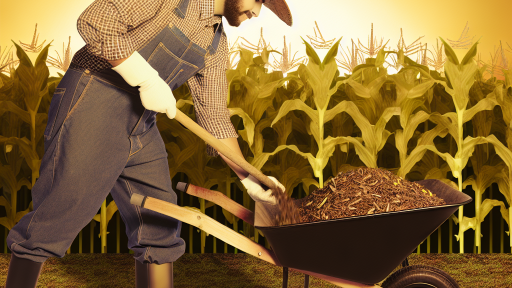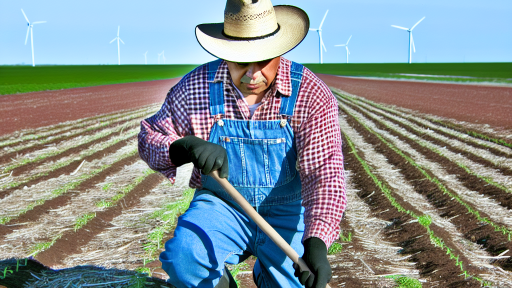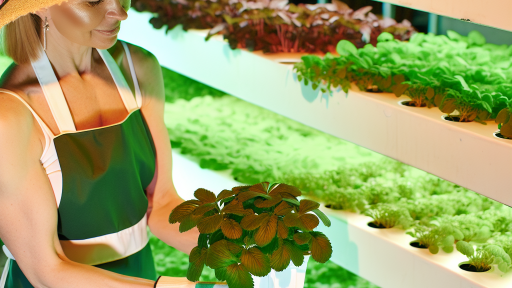Introduction to Data-Driven Decision Making in Agriculture
Data-driven decision making revolutionizes agriculture.
Farmers now utilize data analytics for improved crop yields.
This approach enhances efficiency and productivity on farms.
The Role of Data in Agriculture
Data plays a vital role in modern farming practices.
Farmers collect information from various sources.
This includes weather patterns, soil conditions, and market trends.
Consequently, they make informed decisions about crop cultivation.
Benefits of Data-Driven Approaches
Data-driven approaches offer numerous advantages for farmers.
- First, they increase crop yield through precise insights.
- Second, farmers can optimize resource allocation effectively.
- Third, they reduce operating costs by minimizing waste.
Moreover, these methods lead to better pest and disease management.
Challenges in Implementing Data-Driven Techniques
Despite its benefits, adopting data-driven techniques presents challenges.
One challenge includes data integration from various sources.
Farmers often struggle with different software and systems.
Additionally, there is a learning curve for users unfamiliar with technology.
Case Studies of Successful Implementation
Examples of successful data-driven applications exist globally.
For instance, the McCarty family farm uses sensors to monitor soil moisture.
Transform Your Agribusiness
Unlock your farm's potential with expert advice tailored to your needs. Get actionable steps that drive real results.
Get StartedThis has led to a 20% increase in corn yield.
Another case is the Growers Alliance, which employs AI for pest control.
As a result, they have minimized pesticide use significantly.
The Future of Data in Agriculture
The future of agriculture lies in advanced data analytics.
Emerging technologies will streamline data collection and analysis.
Farmers will increasingly rely on machine learning for predictions.
This evolution will ensure sustainable practices are adopted.
The Role of Big Data in Crop Yield Optimization
Overview of Big Data in Agriculture
Big data revolutionizes agriculture by enhancing decision-making.
Farmers access valuable insights from vast data sets.
This approach enables better forecasting and planning.
As a result, crop yields improve significantly.
Additionally, big data addresses specific challenges in farming.
Data Sources for Crop Optimization
Multiple data sources contribute to optimized crop cultivation.
Sensors and IoT devices monitor soil moisture levels.
Satellite imagery captures crop health indicators.
Weather forecasts provide essential climate information.
Combined, these data sources enhance agricultural strategies.
Precision Agriculture
Precision agriculture uses data analytics to maximize yields.
Farmers apply inputs precisely based on data insights.
This approach reduces waste and minimizes environmental impact.
Predictive Analytics
Predictive analytics forecasts potential crop outcomes.
It analyzes historical data alongside current trends.
Farmers can adjust practices to optimize results accordingly.
Impact of Big Data on Decision Making
Data-driven decisions empower farmers with actionable insights.
Showcase Your Farming Business
Publish your professional farming services profile on our blog for a one-time fee of $200 and reach a dedicated audience of farmers and agribusiness owners.
Publish Your ProfileThis leads to improved resource allocation.
Farmers can better manage irrigation and fertilization.
Enhanced decision-making ultimately drives higher profitability.
Case Studies in Successful Implementation
Many farms benefit from implementing big data strategies.
For example, Green Acres Farm achieved a 30% yield increase.
They used satellite data to optimize planting schedules.
Additionally, River Valley Co-op improved crop quality with analytics.
Future Prospects of Big Data in Agriculture
The future of agriculture will heavily rely on big data.
Technological advancements will enhance data collection methods.
More farmers will adopt smart farming practices.
As a result, global food security can be significantly improved.
Investing in big data solutions will be crucial for success.
Collecting and Analyzing Agricultural Data for Better Insights
Importance of Data-Driven Agriculture
Data-driven agriculture enhances decision-making processes.
This approach improves crop yields and minimizes risks.
Farmers can maximize resource efficiency by utilizing data insights.
Additionally, this method supports sustainable farming practices.
Types of Agricultural Data
A variety of data types contribute to informed decisions.
Soil data includes pH levels, moisture content, and nutrient profiles.
Weather data provides insights into temperature, rainfall, and humidity.
Crop data tracks growth stages, health issues, and yield potential.
Market data helps farmers assess pricing and demand trends.
Data Collection Techniques
Farmers use various techniques to gather necessary data.
Sensors can measure soil moisture and temperature in real-time.
Drones offer aerial imagery for crop health analysis.
Mobile applications enable farmers to track tasks and conditions.
Additionally, satellite imagery provides broad geographical insights.
Data Analysis Methods
Analyzing agricultural data reveals actionable insights.
Statistical analysis helps determine correlations and trends.
Machine learning models predict future outcomes based on historical data.
Visualization tools present data in a user-friendly format.
Farmers can make informed decisions using these analytical techniques.
Implementing Insights into Farming Practices
To optimize crop cultivation, farmers must implement data insights.
Adjusting planting schedules based on weather forecasts can increase yields.
Utilizing precision agriculture techniques enhances input use efficiency.
Additionally, adopting integrated pest management reduces crop damage.
This strategy leads to better overall farm productivity.
Learn More: Integrating Livestock in Organic Crop Management
Case Studies: Successful Implementation of Data-Driven Strategies
Introduction to Data-Driven Agriculture
Data-driven agriculture significantly enhance crop yield.
It leverages information for better decision-making.
Farmers embrace technology to optimize their practices.
Showcase Your Farming Business
Publish your professional farming services profile on our blog for a one-time fee of $200 and reach a dedicated audience of farmers and agribusiness owners.
Publish Your ProfileCase Study: Green Acres Farm
Green Acres Farm utilized soil moisture sensors.
This technology ensured irrigation occurred at optimal times.
Consequently, they reduced water usage by 30%.
Analyzing Results
The farm reported a 15% increase in crop yields.
Additionally, the quality of produce improved significantly.
Local markets responded positively to the enhanced products.
Case Study: Harvest Innovations
Harvest Innovations implemented drone technology for crop monitoring.
They provided real-time data to farmers about plant health.
This timely information allowed farmers to make quick adjustments.
Outcomes of Drone Utilization
The use of drones reduced pest infestations by 25%.
Moreover, farmers experienced lower pesticide costs.
Ultimately, profitability surged across their operations.
Case Study: AgriTech Solutions
AgriTech Solutions incorporated AI in their farming practices.
They analyzed weather patterns and soil health data.
Such analyses helped predict optimal planting dates.
Impact of AI on Crop Cultivation
Farmers enjoyed a 20% increase in overall efficiency.
AI-driven analytics provided detailed recommendations.
This innovation resulted in substantial cost savings.
Significance of Data-Driven Approaches
Collectively, these case studies showcase powerful strategies.
Data-driven decisions lead to significant agricultural advancements.
The future of farming will be shaped by technology and data.
See Related Content: Improving Soil Structure for Higher Crop Yields
Tools and Technologies for Precision Agriculture
Importance of Precision Agriculture
Precision agriculture enhances farming efficiency and sustainability.
This approach leverages data for informed decision-making.
Ultimately, it maximizes crop yields while reducing waste.
Remote Sensing Technologies
Remote sensing technologies collect vital data about crops and soil.
Farmers use satellites and drones to monitor their fields.
These tools provide real-time information on crop health.
Consequently, farmers can adjust their practices effectively.
Types of Remote Sensing
There are various types of remote sensing methods.
- Satellite imagery offers a broad perspective.
- Drones provide high-resolution data for specific areas.
- Ground-based sensors monitor changes in soil conditions.
Soil Moisture Sensors
Soil moisture sensors play a crucial role in precision agriculture.
These devices measure the water content in the soil.
Farmers can optimize irrigation practices, saving both water and cost.
Moreover, timely data helps prevent over-irrigation and under-irrigation.
Types of Soil Moisture Sensors
Different types of soil moisture sensors exist in the market.
- Capacitance sensors measure moisture based on dielectric constant.
- Tensiometers track soil tension to indicate moisture levels.
- Time-domain reflectometry sensors assess soil water content.
Crop Monitoring Systems
Crop monitoring systems provide insights into field management.
They analyze factors such as growth rates and health status.
Additionally, these systems often integrate satellite and drone data.
As a result, farmers gain a comprehensive view of their crops.
Benefits of Crop Monitoring
Effective crop monitoring leads to numerous benefits.
Showcase Your Farming Business
Publish your professional farming services profile on our blog for a one-time fee of $200 and reach a dedicated audience of farmers and agribusiness owners.
Publish Your Profile- It allows for targeted interventions during critical growth stages.
- Farmers can identify pests or diseases early on.
- Ultimately, it leads to better resource allocation.
Data Analytics in Agriculture
Data analytics enables farmers to make data-driven decisions.
Farmers analyze historical data to predict future trends.
For instance, weather predictions and soil conditions inform planting schedules.
Overall, informed decisions yield higher productivity and profits.
Applications of Data Analytics
Data analytics finds various applications in agriculture.
- Yield forecasting helps farmers plan for harvest time.
- Market analysis enables better pricing strategies.
- Resource management optimizes fertilizer and pesticide use.
Discover More: Conservation Tillage: Benefits for Soil Health

Challenges in Data Management and Analysis for Farmers
Data Overload
Farmers often face an overwhelming amount of data.
This abundance can lead to confusion and indecision.
Many struggle to differentiate between useful and irrelevant information.
Consequently, farmers may ignore valuable insights.
Inadequate Technology
Access to proper technology remains a significant barrier.
Many farmers lack the necessary tools for data collection.
Furthermore, outdated software can hinder effective analysis.
This limitation affects timely decision-making.
Data Integration Issues
Data often resides in multiple systems.
This fragmentation leads to difficulties in data integration.
Farmers may find it challenging to unify their data sets.
Consequently, they may miss crucial trends and patterns.
Skills Gap
Many farmers lack formal training in data analysis.
This skills gap can impede their ability to interpret data effectively.
Additionally, reliance on external consultants can be costly.
Farmers often need to enhance their data literacy.
Costs of Implementation
Investing in advanced data solutions can be expensive.
Many small-scale farmers struggle to afford modern systems.
This financial burden can discourage the adoption of data-driven methods.
As a result, they may miss out on potential productivity gains.
Regulatory Compliance
Navigating agricultural regulations can complicate data use.
Farmers must ensure compliance with various data privacy laws.
This requirement can limit data sharing and collaboration opportunities.
Consequently, farmers may face challenges in implementing best practices.
Learn More: Organic Mulching Solutions for Healthier Crops
The Future of Data-Driven Farming: Trends and Innovations
Emerging Technologies in Agriculture
Technology plays a pivotal role in revolutionizing agriculture.
Farmers now utilize drones for precision monitoring of crops.
These devices provide real-time data on crop health and soil conditions.
Moreover, automation technology enhances efficiency in planting and harvesting.
For instance, robotic systems can manage entire fields autonomously.
Data Analytics for Informed Decisions
Data analytics transforms how farmers make decisions.
With advanced algorithms, they can analyze vast amounts of agricultural data.
This analysis includes weather patterns, soil health, and crop yield predictions.
Consequently, farmers can optimize their planting schedules and resource allocation.
Showcase Your Farming Business
Publish your professional farming services profile on our blog for a one-time fee of $200 and reach a dedicated audience of farmers and agribusiness owners.
Publish Your ProfileMoreover, predictive analytics assists in mitigating risks associated with climate change.
The Role of IoT in Agriculture
The Internet of Things (IoT) is reshaping agricultural practices.
Farmers can now connect devices to monitor conditions remotely.
For example, smart sensors track moisture levels in real time.
This technology enables farmers to water crops more effectively.
Additionally, IoT devices help manage pest control through alerts.
Sustainable Practices through Data
Data-driven approaches support sustainable farming practices.
Farmers can track resource usage to reduce waste significantly.
Furthermore, technology enables precision agriculture techniques.
This method increases crop yield while minimizing environmental impacts.
As a result, agriculture becomes more sustainable and efficient.
Collaboration and Knowledge Sharing
Farmers are increasingly collaborating to share data and insights.
This trend fosters innovation and improves overall farming practices.
Organizations provide platforms for farmers to exchange information.
Through shared knowledge, they can address common challenges effectively.
In addition, educational programs enhance farmers’ data literacy.
Best Practices for Implementing Data-Driven Approaches in Crop Cultivation
Adopting Technology
Begin by integrating advanced technology into your farming practices.
Utilize precision agriculture tools for accurate data collection.
Employ drones and satellite imagery for comprehensive field analysis.
This approach helps in monitoring crop health efficiently.
Data Collection and Management
Establish a robust data collection system for continuous monitoring.
Gather data on soil conditions, weather patterns, and crop growth.
Categorize and store this information systematically for easy access.
Moreover, consider using cloud-based platforms for data storage.
Data Analysis Techniques
Implement data analysis techniques to interpret the collected information.
Use statistical tools to identify trends and correlations in the data.
Moreover, machine learning algorithms can provide predictive insights.
This analysis informs decision-making for crop management strategies.
Implementing Recommendations
Act on the insights drawn from your data analysis.
Adapt your cultivation practices based on the findings.
This may include adjusting planting schedules or modifying irrigation systems.
Regularly review and refine these practices as new data emerges.
Training and Education
Invest in training programs for your team on data usage.
Provide resources and tools for effective data interpretation.
Encourage a culture of continuous learning within your organization.
By doing so, you enhance overall operational efficiency.
Collaboration with Experts
Engage with agricultural data specialists and agronomists.
Collaboration can lead to more insightful data analysis.
Furthermore, experts can provide tailored recommendations for your crops.
Build partnerships with data service companies for better support.
Showcase Your Farming Business
Publish your professional farming services profile on our blog for a one-time fee of $200 and reach a dedicated audience of farmers and agribusiness owners.
Publish Your ProfileAdditional Resources
Enhancing smart farming through the applications of Agriculture 4.0 …




